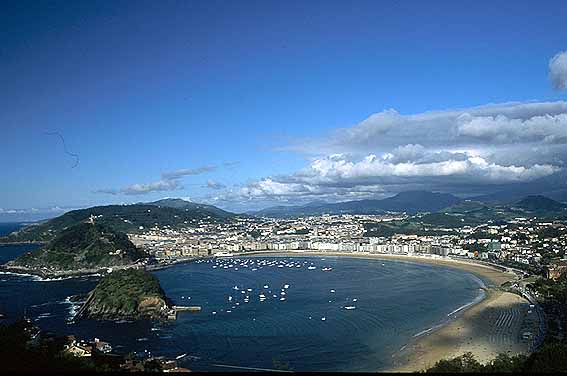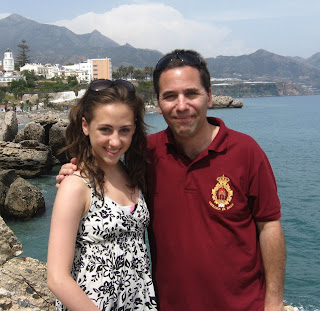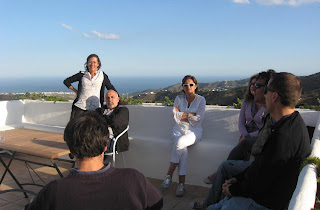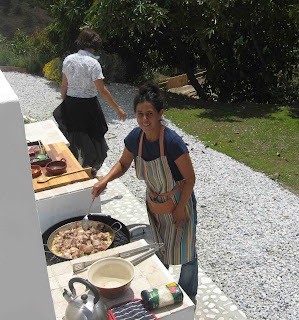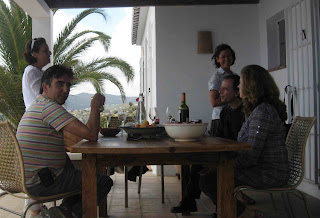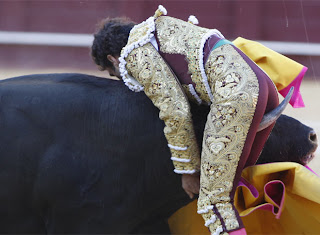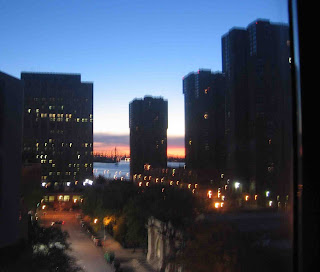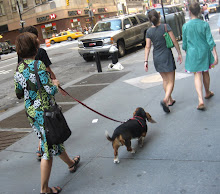 So much for the experiment: the photo of the Nigerian minister has not produced any results, nor has the inclusion of famous airheads. We move on. Yesterday, Feast of St. John, we visited Tolosa, where the locals celebrate their patron saint's day by marching around town parodying nineteenth century militias and generally acting silly. Noah Aldrich, there on a brief informal exchange, participated as a member of the "Peña Unión". It was a fun experience, something a little different and no doubt interesting for Cristina's friends. After the girls left I stayed and joined Pili and her family for a big holiday meal, which culminated with some wonderful roasted duck. And an extremely tempting invitation: Pili's brother Juan Carlos invited me to come back next year and march with his company as a rifleman (escopetero). He's the captain. Would I ever like to do that! If we could just get armies around the world committed to having fun, we could solve a whole hell of a lot of problems. March, dance, sing silly songs, fire a round of blanks into the air. Basques are really into marching around the streets of their towns in uniform. Andalusians are more into pilgrimages to the homes of goddesses, often on mountain tops, to drink, sing, and, dance. Everyone have fun!
So much for the experiment: the photo of the Nigerian minister has not produced any results, nor has the inclusion of famous airheads. We move on. Yesterday, Feast of St. John, we visited Tolosa, where the locals celebrate their patron saint's day by marching around town parodying nineteenth century militias and generally acting silly. Noah Aldrich, there on a brief informal exchange, participated as a member of the "Peña Unión". It was a fun experience, something a little different and no doubt interesting for Cristina's friends. After the girls left I stayed and joined Pili and her family for a big holiday meal, which culminated with some wonderful roasted duck. And an extremely tempting invitation: Pili's brother Juan Carlos invited me to come back next year and march with his company as a rifleman (escopetero). He's the captain. Would I ever like to do that! If we could just get armies around the world committed to having fun, we could solve a whole hell of a lot of problems. March, dance, sing silly songs, fire a round of blanks into the air. Basques are really into marching around the streets of their towns in uniform. Andalusians are more into pilgrimages to the homes of goddesses, often on mountain tops, to drink, sing, and, dance. Everyone have fun!A couple of days ago, I took Daniel to the post office. A rather taxing little errand (I had to park the car!) after which Daniel invited me to recuperate with a quick visit to the bar next door. He wanted me to try a little tapa (pintxo, here in the Basque Country) they do: a slice of bread topped with a quail's egg, caviar and just a dab of mayonnaise. Excellent. Daniel then suggested we compensate the relative saltiness of that treat with something else. Oysters. Hit the spot.


